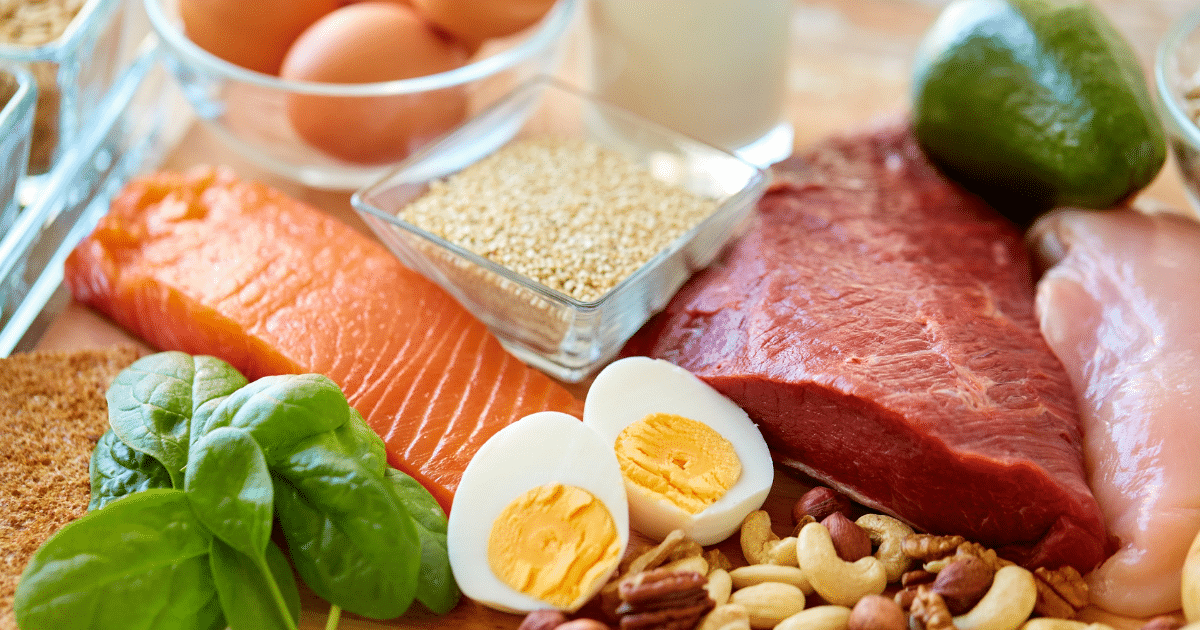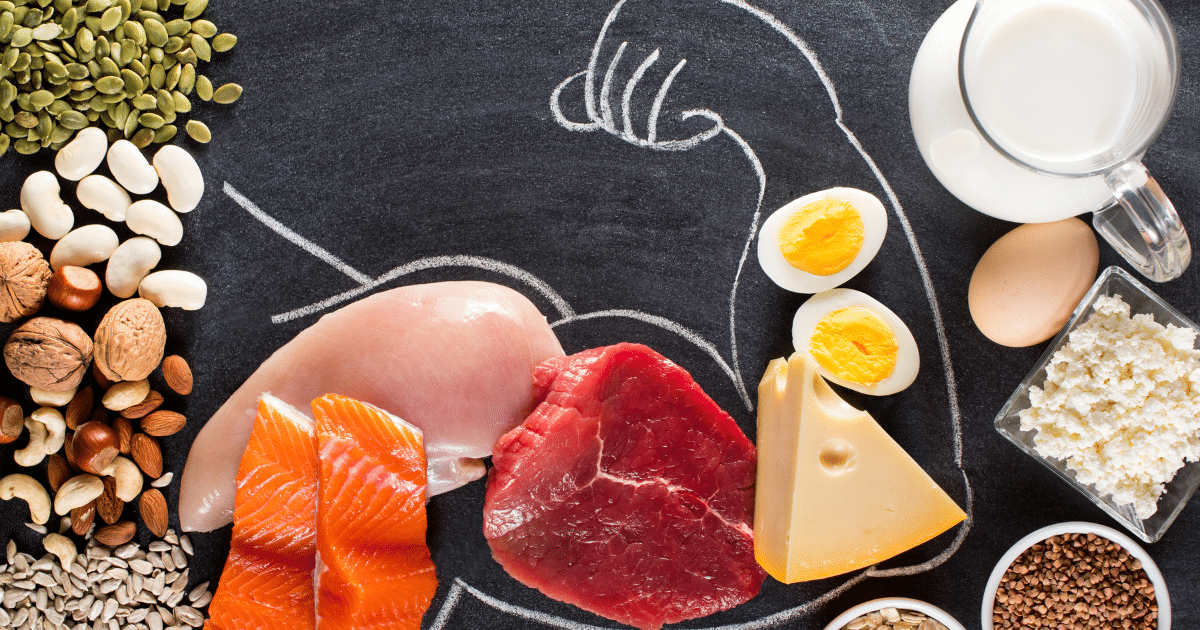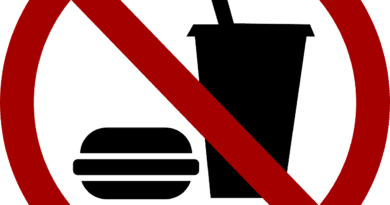The Reason to Prioritize Protein in a Healthy Diet
When it comes to a healthy diet, there are three main macronutrients we all need to be familiar with. Those three key nutrients include carbohydrates, fat, and today’s focus — protein. With so many fad diets out there today, the scale seems to tip in one direction or the other when it comes to carbohydrates and fat, while one nutrient remains the same in terms of importance, which is protein.
A hot topic of discussion is how much protein you should be consuming on a daily basis as part of a healthy diet. As a rule of thumb to follow, the Recommended Dietary Allowance (RDA) for protein is set at 0.8g per kilogram of body weight daily. That should be the lowest amount of protein you consume daily.
As an example, let’s say you’re 150 pounds. When you convert that weight to kilograms, you get 68 kilograms. 0.8g per kilogram using 68 kilograms is 54g of protein you would need to consume per day in your healthy diet. If you live an active lifestyle, that number can be increased to between 1.2-2.0 grams of protein per kilogram of body weight to help provide your body with adequate protein to help rebuild the torn-down muscle fibers due to intense exercise.

But the question arises, “What exactly is the role of protein in a healthy diet?” Below are eight examples of how important protein is, why you need it in a healthy diet, and why you should be sure to prioritize it in your meals.
Disclaimer: This article is for informational purposes only and is not meant to treat or diagnose any condition. It is recommended that you speak with your doctor before starting any exercise program, changing your daily nutrition, or adding any supplements to your regimen.
Table of contents

What is the Role of Protein in a Healthy Diet?
Below is a list of all the benefits you can experience from increasing the amount of protein you consume in your healthy diet:
1. Build Lean Muscle
Protein is the building block for muscles and needs to be a focus of any healthy diet. For muscles to be repaired, rebuilt, and grow (hypertrophy), they need adequate protein, which can then be broken down into usable amino acids. By building lean muscle mass, you can get stronger, and normal daily activities can become easier.
Related Article: Does The Protein Source You Use Really Matter?
Maintaining your strength and lean muscle mass is also important as you age so that you can maintain your health and activity level — essentially, your independence and freedom.
2. Help Prevent Muscle Loss
As we age, our bodies tend to lose lean muscle mass — referred to as sarcopenia. This is detrimental in quite a few ways. When total muscle mass is reduced, it can decrease strength. A decrease in strength can cause everyday activities to become more difficult.
Related Article: Are Chicken Farms Fooling You About the Chicken Quality?
Also, when you lose muscle mass, your metabolism starts to slow down. This is because muscles burn calories simply through maintenance and daily functioning — even while at rest. When muscle tissue is lost, it isn’t able to maintain the same energy expenditure per day.
3. Curb Hunger

Adding protein to a healthy diet is a fantastic way to curb hunger and stay satiated longer. You should strive to have protein in all your meals, including snacks. Such protein sources can be chicken, soy, turkey, fish, eggs, nuts, seeds, legumes, Greek yogurt, dairy products, beef, tofu, or any other plant-based protein, to name a few. If you are in a rush, a protein bar, or even a protein shake can be extremely convenient.
But when you include protein in your healthy diet (when compared to carbohydrates and fats), you will feel the fullest following consumption of a protein source (even when consuming less food). The reason for the increase in satiety is that protein helps reduce a hunger hormone called ghrelin while increasing the hormone leptin, which signals to the brain that you are full, and you should stop eating.
4. Support Bones, Skin, and Cartilage Health
There are specific proteins called fibrous proteins (proteins found in muscles, bones, and ligaments). These particular proteins are responsible for providing the body with strength, structure, and flexibility. Collagen, for example, is a protein source used to help improve the strength and health of your hair, skin, and nails. Collagen also plays a vital role in the overall health of your tendons, ligaments, and bones. Animal protein, on the other hand, plays an even bigger role in these factors. Consuming a healthy diet that consists of adequate protein can help reduce the risk of osteoporosis and fractures (common age-related issues).
With age, the elasticity of our skin, joints, and tendons can weaken — causing issues such as aches and pains as well as wrinkles in our skin. Maintaining a healthy diet that includes quality protein can help prevent and delay some of the negative effects of aging while also helping to keep your body strong.
5. May Lower Blood Pressure
When you think of high blood pressure, it’s common to also see blood work that comes back showing high levels of triglycerides and cholesterol. While this isn’t always the case, it tends to go hand-in-hand. However, a healthy diet that includes quality lean protein sources can help decrease your blood pressure.
Related Article: How Much Protein Do You Need If You Exercise Regularly?

Common risks associated with high blood pressure include strokes, heart attacks, and kidney disease. While consuming protein may not eliminate these risks, it can help lower the likelihood of these conditions.
6. Boost Immunity
When it comes to your immune system, it needs protein in order to function optimally. If you are not taking in enough protein through a healthy diet, you run the risk of wearing down your immunity and potentially running an increased risk of illness and disease. Providing adequate protein for the immune system is vital to ensure it remains strong and able to ward off foreign bodies that enter the system and could potentially do us harm.
7. Sustainable Energy
Think for just a moment about energy sources and what provides your body the fuel necessary to not only live but move. The first source that comes to mind is probably carbohydrates. Why? Because they’re the most common. But protein can be used as an energy source as well — and it comes with some unique advantages.

Unlike carbohydrates, protein from a healthy diet doesn’t cause such a spike in blood sugar as most carbohydrate sources do. That spike tends to provide you with a quick energy boost, but shortly after, you find yourself crashing. Protein takes longer to break down compared to carbohydrates, allowing for a more stable and slower rise in blood sugar without the quick and immediate spike — creating a nice steady stream of energy without the abrupt crash.
8. Total Body Regulation
There is so much that could be said here that it’s truly amazing what protein can do for your body. Your red blood cells are made up of proteins called hemoglobin. Hemoglobin is what helps carry oxygenated blood throughout the body. Protein also helps provide cells with their structure and strength — preventing them from collapsing or becoming damaged, which could result in illness or disease.
Digestion also relies on your protein intake. In order for you to break down food, you need enzymes. Some of the protein you consume through a healthy diet goes into producing enzymes as well as other body chemicals.
As we age, our hormone levels tend to fluctuate. Protein found in a healthy diet can help regulate and balance hormones so they aren’t thrown off — causing imbalances and negative effects.


*Disclosure: This article may contain affiliate links or ads, which means we earn a small commission at no extra cost to you if you make a purchase through these links. These commissions help support the operation and maintenance of our website, allowing us to continue producing free valuable content. Your support is genuinely appreciated, whether you choose to use our links or not. Thank you for being a part of our community and enjoying our content.
PLEASE CONSIDER SHARING THIS ON YOUR SOCIAL MEDIA TO HELP OTHERS LEARN MORE ABOUT THIS TOPIC.





